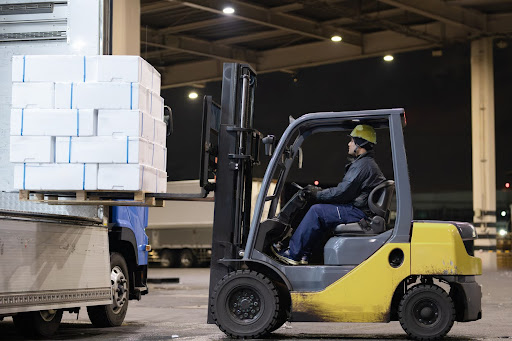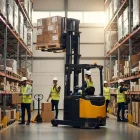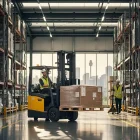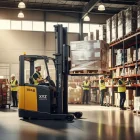Choosing the right forklift can seem like a small decision—until it starts affecting your daily operations. For businesses where lifting, loading, and shifting heavy materials is part of the everyday routine, the forklift isn’t just a tool. It’s a key part of the workflow.
Among the different types available, diesel forklifts have carved out their place as a reliable choice for tough jobs. Whether you’re managing a busy warehouse, working at a construction site, or loading up shipping containers, a diesel forklift offers the kind of strength and consistency that electric or gas models often struggle to match.
But what really makes them worth considering? Let’s break it down.
What Exactly Is a Diesel Forklift?
A diesel forklift runs on—you guessed it—diesel fuel. Unlike electric models that need charging stations or LPG models that require gas cylinders, these machines come with a fuel tank and a powerful engine designed to deliver high torque.
They’re especially suited to outdoor settings where conditions aren’t always smooth. Think muddy ground, rough concrete, or uneven surfaces. Diesel forklifts can handle those without blinking.
You’ll often find them being used in places like:
- Construction zones
- Dockyards and ports
- Outdoor storage facilities
- Manufacturing units with heavy raw materials
They’re built to perform where others might hesitate.
Why Diesel Forklifts Are Still in Demand
1. Raw Power That Doesn’t Quit
Need to lift a couple of tonnes without stressing the machine? That’s where diesel forklifts shine. The engines are strong and built to carry weight without slowing down. You don’t need to second-guess whether the machine can handle a particular load—it usually can.
Whether it’s large pallets, construction supplies, or awkwardly shaped materials, diesel forklifts do the heavy lifting with ease.
2. Perfect for the Outdoors
Electric forklifts are quiet and clean, but they’re not made for every environment. Diesel forklifts, on the other hand, are made for tough weather, uneven ground, and long outdoor shifts. They have better ground clearance and strong tires, making them less prone to slipping or getting stuck.
So if you work where the surface isn’t always flat and dry, diesel forklifts bring peace of mind.
3. No Worry About Charging Time
A big issue with electric forklifts? Charging. Once the battery’s dead, you’re looking at several hours of downtime. Diesel forklifts avoid this altogether. Refuel in minutes and get back to work—no waiting, no backup machine required.
This quick turnaround matters when productivity can’t afford pauses.
4. Solid Fuel Economy for Long Shifts
You might think diesel is costly, but in long, continuous use—especially for heavy-duty tasks—diesel forklifts turn out to be quite efficient. They stretch a tank of fuel well and don’t slow down as they work.
If you’re currently browsing for a diesel forklift for sale, it’s worth considering how much you’ll save in the long run on refueling and repairs.
5. Long-Term Durability
Diesel forklifts are workhorses. They’re designed with strength in mind, so wear and tear doesn’t come knocking every few months. With proper maintenance, one machine can keep going for years without major overhauls.
This not only saves on repair costs but also keeps operations smooth, without last-minute equipment breakdowns.
6. Flexible Across Industries
It doesn’t matter if you’re in logistics, agriculture, construction, or waste management—diesel forklifts fit in. Thanks to customizable attachments and solid lifting capabilities, one machine can handle a variety of jobs.
That kind of flexibility reduces the need for multiple machines, simplifying your fleet and cutting down operational headaches.
7. Holds Its Value Over Time
Here’s something a lot of people overlook: resale value. Diesel forklifts don’t depreciate as quickly as you’d expect. If you’ve taken care of it, you can easily sell it down the line and recover a fair chunk of your investment.
This matters if you plan to scale your operations or refresh your fleet later.
Things to Think About Before Buying
Even if diesel sounds perfect, a few practical checks will help you choose the right model for your setup:
- Load Capacity: What’s the heaviest thing you need to lift? Choose accordingly.
- Lifting Height: Consider warehouse racks, container height, or loading dock levels.
- Operating Surface: Rough terrain? Get pneumatic tires. Smooth flooring? Solid rubber might do.
- Attachments: Will you need clamps, rotators, or extensions? Check compatibility.
- Safety Requirements: Alarms, lights, and seat belts should be non-negotiable.
- Emissions Compliance: Make sure the model meets local environmental standards.
Buying without considering these can lead to underperforming equipment—or worse, machines that aren’t legally allowed in your area.
Work with a Dealer That Has Your Back
A solid machine means little without solid support. That’s why picking the right dealer is crucial. A trusted supplier will do more than just hand over the keys—they’ll help you choose the right model, offer after-sales service, and provide maintenance guidance.
Look for ones who offer warranties, servicing options, and flexible payment plans. Those extras can save you a lot of trouble down the road.
Wrapping It Up
At the end of the day, diesel forklifts remain a smart choice for businesses that need real strength, all-day performance, and minimal downtime. They aren’t flashy or new-age, but they deliver where it counts.
If your operations involve outdoor work, heavy loads, or long shifts, there’s a good chance a diesel forklift is the right fit. Just choose wisely, think long-term, and work with people who know the industry.




